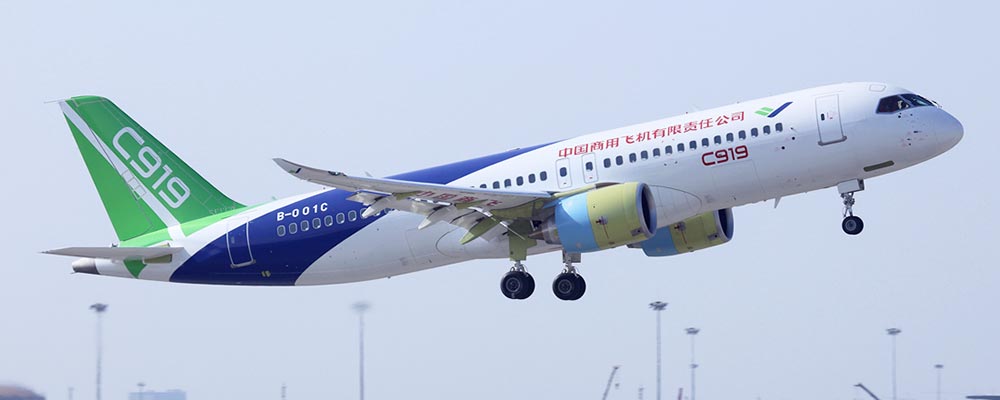
When thinking of the biggest names in the manufacture of aeroplanes, two names immediately spring to mind – Boeing and Airbus. However, a new player in the market has designs on creating a brand similar to that of those two industry champions and a recent test flight of the C919 indicated the first major step towards that goal.
The C919 manufactured by the Commercial Aircraft Corporation of China, Ltd. (Comac) had its first public flight test on 5th May 2017 which was declared a success by its manufacturer. The flight lasted around an hour and was witnessed by a large number of government officials and various aerospace executives.
Comac’s C919 is designed to compete with the Airbus 320 and the Boeing 737, the two single-aisle planes which are the most prevalent in the world’s airlines. The C919 has been in the wings for decades and represents what Comac hopes will be a game-changer for the aerospace industry in China. While it is still very much in its infancy, Airbus and Boeing will be aware that this could be the beginning of a challenge to their successful duopoly.
While the development of the C919 has been hailed as a made-in-China aeroplane, the approach taken by Comac in the aeroplane’s manufacture is an interesting one. It is understood that at least 15 non-Chinese partners such as General Electric Co., Safran SA and Honeywell International Inc. worked on components and systems of the C919. A lot of the key suppliers to Comac have of course a vast range of supply chain experience with Airbus and Boeing and using the same supply chain allows Comac to circumvent many of the technical challenges which would come from building a commercial aeroplane from scratch.
As Yu Zhanfu, a principal at Roland Berger Strategy Consultants in Beijing told Bloomberg, “It’s impractical for Comac not to take advantage of technologies that are already out there. If you insist on doing everything from the ground up by yourself, chances are you will become irrelevant.”
Of 15 non-Chinese suppliers contacted by Bloomberg about their involvement with the C919, eight — FACC AG, Honeywell, Parker Aerospace, UTC Aerospace Systems, Arconic, Liebherr-Aerospace, Eaton and CFM International — responded. All expressed confidence in the new aircraft and the potential for further collaboration in China.
Despite the new competition in the market, the C919 was well received by Airbus and Boeing. “The C919 will bring new competition to the market,” Airbus said in a statement and Yukui Wang, a Boeing spokesman, added: “We’d like to take this opportunity to congratulate Comac for the successful development of the C919 airplane.”
For China, the C919 is seen as just the beginning. Even if the plane proves less fuel-efficient than any Western alternatives which some commentators have suggested, the state-controlled Chinese airline industry may still be required to buy it, and the Chinese aviation market in the coming years is expected to rival only the American market in size and perhaps even surpass it. Therefore for those in the supply chain, Comac’s emergence can be viewed as an enormous potential area for business growth.
For any questions about Aerospace Law or supply chain contracts, please contact Ed Nurse on 0116 281 6230 or by email at ed.nurse@bhwsolicitors.com.
